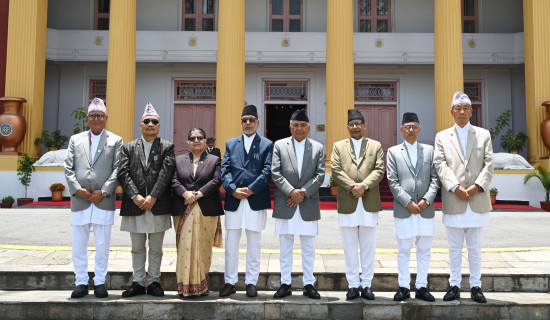- Wednesday, 2 July 2025
Sense Of Identity
As mature people, we feel secure in the knowledge and assurance of our self-identity. And we mostly think we know ourselves. No one knows us better than ourselves. Or so we think. From the profound journey of childhood to adulthood, we grow a sense of self and identity that is intricately built through our environment. We are an accumulation of our sensory perceptions, cognition, past experiences, memories, parental guidance, education, kinship ties, etc. Yet, there comes a moment in a person’s life when a question of identity seeps in.
We tend to identify ourselves with material possessions, professional accomplishments, education, achievements, relations and family. However, the question is whether we are quite truly in sync with our emotions, thoughts, feelings and motivations. Are we what we possess or is there a core within ourselves that is constant despite the ups and downs and the abundance and the lack we feel in our lives? We may think that we are quite content with our sense of identity until the moment of crisis, drastic change or life-altering events in our lives. It is then that our self-concept faces a monumental reevaluation. In the light of new events and situations, we question our self-identity.
Do you feel validated by the approval of people in your life? Does your sense of self accumulate from such validations? It might seem quite innocuous but our identity shouldn’t be based on recognition, acceptance and veneration because what if such approvals are lost or diminished? When our core beliefs are tied up with events outside of our self, we become too dependent on them. Thus, psychologists emphasise a sense of independence and autonomy when it comes to one’s identity.
The more we are in tune with ourselves, our values, beliefs and emotions, the more pragmatic we become. And it is necessary to be in sync with our core as it signals stability and an unwavering faith in one’s self. Psychologists go one step further and stress the necessity of being authentic. According to Psychology Today, “Everyone subconsciously internalises conventions and expectations that dictate how they believe they should think or behave. The decision to examine or challenge those assumptions, even though it’s difficult, is the first step to living more authentically.”
When we step aside from things that we think define us, we can find an indelible inner centre free of judgements, bias, prejudices and external influences. We ought to connect to this inner self for an authentic life. It could help grant us the privilege of profound soul-searching questions and the quest for our spirituality.
The status and roles in our lives may or may not be constant. Our bank balance may fluctuate. Our health may deteriorate. We may lose our jobs, status, friends and relationships or face severe adversities. But despite all the lack or gain, our sense of identity doesn’t have to be tied to the external events. We are much larger than our achievements or lacks, which is why it is essential that our sense of identity be honest representations of our values, principles and beliefs for the betterment of both ourselves and the people in our lives. Ultimately, our authentic sense of identity will give us true meaning and strength.




-square-thumb.jpg)
copy-square-thumb.jpg)
-original-thumb.jpg)
-square-thumb.jpg)
-square-thumb.jpg)







